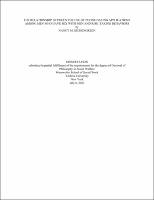Please use this identifier to cite or link to this item:
https://hdl.handle.net/20.500.12202/9042Full metadata record
| DC Field | Value | Language |
|---|---|---|
| dc.contributor.advisor | Stein, Gary L | - |
| dc.contributor.advisor | Wolock, Isabel | - |
| dc.contributor.advisor | Abbott, Ann | - |
| dc.contributor.advisor | Genera, Carlos | - |
| dc.contributor.author | Eichengreen, Nancy Mathilda | - |
| dc.date.accessioned | 2023-07-07T15:02:02Z | - |
| dc.date.available | 2023-07-07T15:02:02Z | - |
| dc.date.issued | 2023-07-06 | - |
| dc.identifier.citation | Eichengreen, N. M. (2023, July 6). The relationship between the use of phone dating applications among men who have sex with men and risk-taking behaviors (Publication No. 30569171) [Doctoral dissertation, Yeshiva University]. PDTG | en_US |
| dc.identifier.uri | https://hdl.handle.net/20.500.12202/9042 | - |
| dc.description | Doctoral dissertation, PhD / Open Access | en_US |
| dc.description.abstract | A mixed-method study was designed to explore the influence of phone dating applications and risk-taking behaviors among a convenience sample of 42 cisgender men who have sex with men (MSM) controlling for certain psychosocial factors including Mental Health Issues (Depression and Sexual Compulsivity), Health Beliefs and Risk Perceptions, Alcohol and Substance Abuse. Subjects were interviewed telephonically during a two-step process to gather quantitative and qualitative data. During Phase I, each subject completed the three test instruments, (i) 36-item Questionnaire Survey, (ii) Beck’s Depression Inventory Scale and (iii) Sexual Addiction Screening Test (SAST-R). The Questionnaire survey gathered demographic data, examined sexual health beliefs and risk perceptions, inquired about safe sex practices and intimate choices made by participants during casual sexual encounters. A subgroup of 11 participants selected from the original 42-person sample participated in 15-question qualitative interview to explore in further depth the responses provided to the above-referenced test instruments. The sample was also questioned about pandemic risk-taking behaviors to determine whether subjects felt at risk for COVID-19 virus and whether participants adhered to safety guidelines to reduce social contact. The purpose of this study was to gain a better understanding of the factors which contribute to High-Risk Sexual Behaviors among a vulnerable sexual minority to reduce high rates of HIV and STDs. ¶ Findings indicated the method used to connect with potential partners (phone dating applications, Internet or in-person venue cruising) did not predict high-risk sexual behaviors. Results revealed statistically significant relationship between Mental Health Issues and High-Risk Sexual Behaviors. Likewise, Health Beliefs and Risk Perceptions were linked to High-Risk Sexual Behaviors. Additionally, higher number hours spent in sex-seeking activity was tied to High-Risk Sexual Behaviors. Results pointed to a greater risk level among young, African American, and Hispanic MSM. ¶ Finding pointed to the urgent need for free and low-cost sexual healthcare, education, testing and treatment for MSM. Access to mental healthcare was found to be crucial factor to reduce risk-taking behavior. Outreach efforts in high-risk communities should be explored including kiosks and mobile van to distribute these services | en_US |
| dc.language.iso | en_US | en_US |
| dc.publisher | Yeshiva University | en_US |
| dc.relation.ispartofseries | Wurzweiler School of Social Work Dissertations;Publication No. 30569171 | - |
| dc.rights | Attribution-NonCommercial-NoDerivs 3.0 United States | * |
| dc.rights.uri | http://creativecommons.org/licenses/by-nc-nd/3.0/us/ | * |
| dc.subject | Mental health | en_US |
| dc.subject | Behavioral sciences | en_US |
| dc.subject | LGBTQ studies | en_US |
| dc.subject | alcohol and substance abuse | en_US |
| dc.subject | HIV | en_US |
| dc.subject | phone dating applications | en_US |
| dc.subject | psychosocial factors | en_US |
| dc.subject | sexual behavior | en_US |
| dc.subject | STDs | en_US |
| dc.title | The relationship between the use of phone dating applications among men who have sex with men and risk-taking behaviors | en_US |
| dc.type | Dissertation | en_US |
| Appears in Collections: | Wurzweiler School of Social Work: Dissertations | |
Files in This Item:
| File | Description | Size | Format | |
|---|---|---|---|---|
| Nancy Eichengreen Final PhD Dissertation July 2023.pdf | 1.76 MB | Adobe PDF |  View/Open |
This item is licensed under a Creative Commons License

